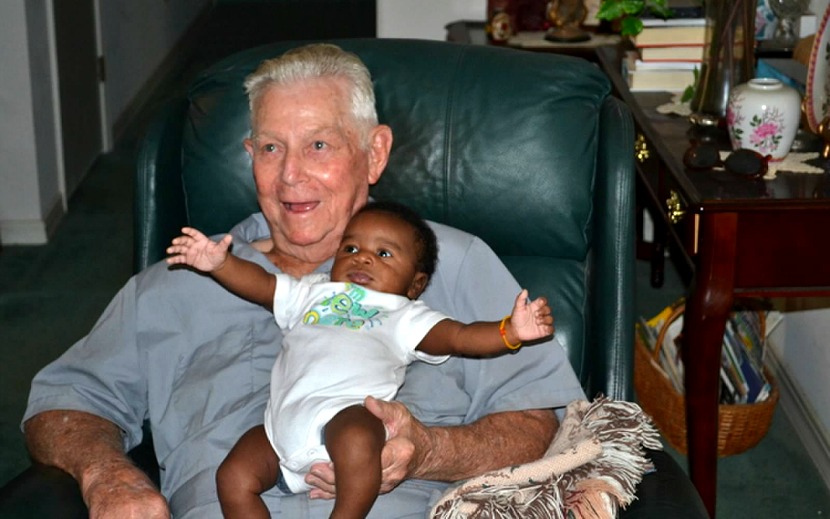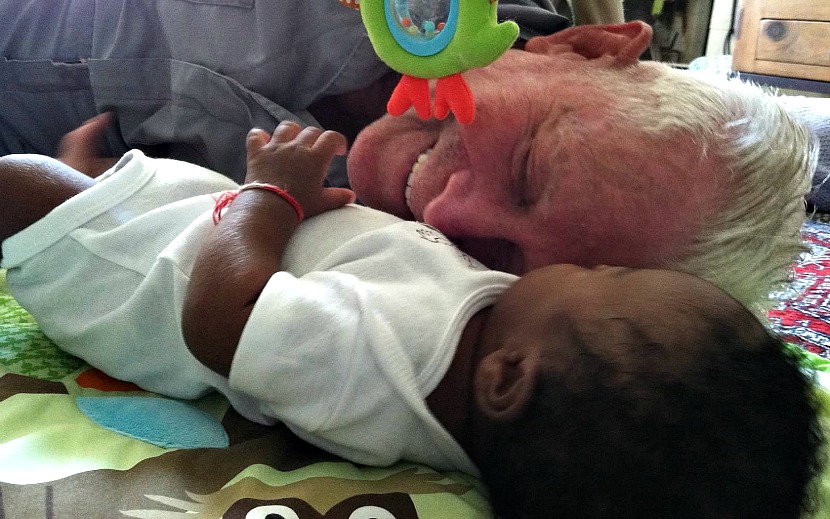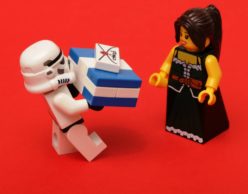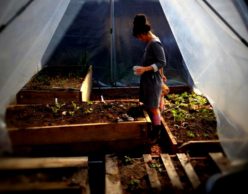Building a Village, One Papaw at a Time

Indian. White. Black. Gay. Interracial. Biracial. Multiracial. Biological. Adopted. Mash-Up families are complex. Adoptive ones especially so. In this, the second installment of a three-part series, our Indian-American Mash-Up Nishta Mehra tells us how she built a supportive community around her queer, multiracial family. Because it takes a village — a big, complicated village.
Read Part 1 of her story: No Box Unchecked: How We Became A Family.
My father-in-law was born in east Texas in 1922. The son of sharecroppers, he dropped out of school in the seventh grade to help support his family during the Depression. He is a kind man with a big heart who tells a damn fine story, loves Jesus, and is vain about his hair. And like many straight, white men of his generation, he embodies a whole host of seemingly contradictory attitudes and behaviors when it comes to race. He grew up working alongside black folks; for decades, he and his wife attended and were actively involved in the leadership of Shreveport’s largest integrated church. But he also grew up swimming in racist waters — its language, assumptions, resentment and fear.
A Black grandson was not something he ever expected.
At first, his objections to our adoption plan were commingled with a conversation about how “two women aren’t supposed to be parents.” Jill’s been out to her parents since the early 1990s, and the two of us have been together since the early 2000s. They take a kind of “hate the sin, love the sinner” approach that has been workable enough; say what you will, but plenty of folks in their position choose being right over being in relationships. My in-laws have never been anything but loving toward me. But I doubt they consider themselves my in-laws.
When Jill called her parents to tell them we had been matched with a Black birth mother, it became clear that Jill’s father’s strongly objected to a Black child becoming part of his family. The oldest, ugliest parts of him dominated his gut reaction. I wasn’t on the phone, but I know the phrase “black blood” was used.
I’m an old man,” he said. “But I’m asking God to change my heart.
Jill was unequivocal in her response: “This is a demand and not a request. You have to act in a loving way toward my child, regardless of what you feel or think. And if you cannot act in a loving way towards my child, you will not be permitted to see my child. And because of that, you will see a whole lot less of me.”
That was where we left it. With just weeks to ready ourselves to become parents, we refused to let my father-in-law’s reaction rob us of our anticipation and joy. That was easier said than done, of course. Jill distanced herself inside their conversations, preparing to face another kind of distance — the kind we would self-impose to protect our child, if necessary.
Then Shiv was born. We knew something had cracked open when Jill’s dad kept calling to ask “about the baby.”
“How’s the baby doing? Is he eating? Is he sleeping good?”
On the day we brought our son home from the hospital, my father-in-law called Jill and told her that he had been talking to his friends, to other family members, and to his pastor at church, and that now he was planning to ask God for something. “I’m an old man,” he said. “I been seeing things one way my whole life. But I’m asking God to change my heart.”
“Your God is a God of miracles, Daddy,” she responded. “I believe that He will change your heart if you want him to.”
One month later, Jill’s parents came to visit. Jill texted me a photo at work of her dad lying on the floor next to Shiv while Shiv did his tummy time. It was all over. We went from seeing them every three to four months to seeing them every four to six weeks. They now live less than two miles from our house; Shiv sees his Papaw almost every day.

It’s not a panacea, of course. My father-in-law was a white police officer in the Deep South in the fifties and sixties; those sets of biases and privilege would take a lot more than a toddler to undo. Just because he realized he was wrong or short-sighted about Shiv does not mean he realizes that he’s wrong or short-sighted about other people or institutions. Sometimes the specific translates to the general, but sometimes it doesn’t.
It’s complicated. We don’t see eye-to-eye with my in-laws about a lot of things: religion, race, discipline methods, politics. There are limits to our dinner table conversation, limits to the relationship: arguments we try to save ourselves from having. And my mother-in-law’s Alzheimer’s only adds stress to the situation for everyone. There are times when Shiv draws her out and makes her laugh like no one else can anymore. Then there have been times that she’s looked at her grandson and asked “Who’s that?”
Once, when he was still very little, she slipped and used the word “nigger” — a word Jill grew up hearing regularly — in an idiom, though I’ve since forgotten what it was. “Mother!” Jill hissed. “You cannot use that word. You cannot ever say it around him,” she emphasized, pointing to Shiv.
The Ferguson grand jury decision was announced on my birthday this year. Here’s what I posted on Facebook that night:
here’s what I need you to know: if you want to ignore or excuse or downplay what’s happening in Ferguson right now, or if you’re unwilling to see the truth of the systemic injustice around race that is alive and well in this country, or if you think that it has nothing to do with you BUT you still want to comment on how adorable my son is or “like” his pictures and videos and generally say warm & fuzzy things about my family? you should know that it feels personal for me & Jill, it IS personal. and if you aren’t outraged, you aren’t paying attention. and if you can’t handle my outrage, please (not sarcastic) feel free to unfriend me. the end, for now.
It’s rarely easy, knowing when to speak up or out, and when to just close the computer screen and walk away. Parenting Shiv has been a profound learning experience for us both, as parenting most certainly always is for everyone, but with the added layer of confronting our own privilege and evaluating the world, our assumptions, and our environment with what feels like new sight. Both Jill and I have found ourselves inside of sticky conversations and have reevaluated or distanced ourselves from certain people. For Jill, as a white woman, the struggle has been acutely intense. For the first time in her life, her privilege is no longer an intellectual concept but a reality that she viscerally confronts almost daily.
You learn pretty quickly who “gets” it and who doesn’t. And not getting it is a deal breaker for me now. With most issues, I value having lots of different opinions surrounding me. But while I may be able to tolerate folks who believe different things than I do about gay marriage, global warming, or Jesus, I have no patience for ignorant-ass comments about why #blacklivesmatter should be #alllivesmatter. If folks are willing to ask questions and actually hear my response (which has happened a few times, so not all of humanity is lost!), then okay. But otherwise I’m hitting “unfriend” and I ain’t looking back.
Shiv attracts attention wherever we go. But let’s be real. Soon the attention will be from people who view him as a criminal, a thug.
Loving our son brings a good deal of clarity. Yet seeing the world through his eyes — or more accurately, seeing how it will see him, seeing what I will be forced to discuss with him — can make it challenging not to just live inside of anger all of the time.
My son is big, and though he loves to dance more than almost anything (except dinosaurs; he really, really loves dinosaurs), the default response to him is always “Future football player!” He is handsome and charming (most of the time), so we also get a lot of “The ladies better watch out!” Like, really, we can’t think of any other things that Black men do except play football and sleep with women?
But those assumptions feel innocuous compared to what I know is coming. Shiv is decidedly an extrovert and, from a very young age, has attracted attention wherever we go: He declares “Hi people!” as if greeting his adoring fans, at Whole Foods, at Target, at the Post Office, and on and on. But let’s be real, when he’s fifteen years old and 180 pounds and 6 feet tall, he is going to attract a very different kind of attention. The attention will be from people who view him as a criminal, a threat, a thug, as trouble.
And the truth is that Shiv would have represented all of those things to his own Papaw if they were to meet under another scenario, as white police officer and Black man, instead of as grandfather and grandson.
We have been conscious about cultivating our family’s “village” from the start. When you’ve fought cancer (as we have done) and readied your household for a baby in a mere 17 days (as we have also done), you learn the strength of your community, the importance of asking for help, and the power of involving those who love you in the daily-ness of your lives and challenges.
With a Black son in the picture, that necessity only expanded. Thank God for friends who have helped us to field all of the questions we didn’t know we would have, like: Why is it still so hard to find children’s books with characters that aren’t white? Why does everyone feel entitled to ask about Shiv while we are standing in the grocery store checkout line? Why do people insist on saying “Oh, he’s such a lucky little boy,” as if he’s some kind of charity case and not the love of our freaking lives?
We built our village deliberately, but we didn’t build it just for Shiv. It was never, “Oh, we have a Black kid, we should get some Black friends!”
Our village is for our whole family. Jill’s self-proclaimed redneck, hog hunting cousins who affirm and support us via Facebook. Our beloved friends Vicky and Lois, whom I “inherited” when I met Jill, now Shiv’s “Vippy” and “Lolo,” who live on a beautiful farm where our whole family goes to relax and romp, who bring raw milk to our doorstep twice a month so we don’t have to make the trip down to the dairy.
My dear group of college friends, who have lovingly stepped into their extended family roles — Aunt Megan, who was Shiv’s very first visitor and will take him to his first ballet; Uncle Dave, who’s already signed up to teach him chess and indoctrinate him as an Arsenal soccer fan; Uncle Phil (father to mash-up baby Sophia, who is part WASP and part Ukrainian), who took Shiv on his first trip inside a men’s room; and Uncle Sacha and Aunt Maconda (in Shiv parlance, “Uncle Sachaconda”), whose baby boy is due in March, Shiv’s future cousin and fellow bilingual baby (Dad speaks French).
Aunt Kym was scheduled to be our “Black hair consultant” when we thought Shiv was going to be a girl.
There’s more: Aunt Kym, who was scheduled to be our “Black hair consultant” when we thought Shiv was going to be a girl, and who makes a point of having a “Shiv date” at least once a month. We already know that her house will be the first place he spends the night other than our house or his grandmother’s. Aunt Coco — who is tattooed, Jewish, and married to a former Mormon — uses her considerable crafting skills to bestow upon Shiv a dazzling array of handmade things, most notably an entire set of knitted fruits & vegetables for his play kitchen. And we haven’t even touched on the crazy Indian village I grew up inside of, my uncles and aunties who are Shiv’s extra sets of grandparents, who send him $51 or $101 checks (odd numbers are considered good luck) for his college fund, who have folded him in from the start, and Jill, too.
The village never stops evolving. Shiv has certainly altered the trajectory of that growth in the sense that his presence in our lives has confirmed, not altered, what we value about the people we surround ourselves with. When I struggled early on, worrying whether or not we were the right people to parent a Black son, I felt deep reassurance in the knowledge that our village would be there to guide and support us. And indeed, Shiv has become woven into the fabric of our community, which is his community now, too — and he draws new people into it just as Jill and I do.
While we haven’t gone out and recruited a new slate of Black friends, we have strengthened existing connections and asked advice from the Black people in our lives. We gave a lot of thought to where Shiv attends preschool, where we are the only same-sex parents but far from the only mixed-race family and he is one of many boys of color. We make sure that Shiv gets to see faces that look like his: in books, in real life, when he sits on Santa’s lap.
We know we can’t anticipate every contingency, every Ferguson that will test our strength. In a lot of ways, Shiv will be our guide. We trust that, if we pay attention to him, instead of to our assumptions and projections, he will show us what he needs.
After all, he is going to have to make a reckoning of his identity himself, as all of us Mash-ups ultimately have to do. We can give him a context and a framework, lots of resources, and then let him invent himself. No one else will decide for him what his blackness, or any other part of his identity, means.
And we can follow Papaw’s lead. We can confess the places where our sight is limited and our minds are closed. We can ask for help when we are unsure how to proceed. We can let our love transform us.
Part 3 of Nishta’s story, coming soon, will include her best tips, advice and guidance on biracial adoption. Have a question for her? Email us at yo@mashupamericans.com.





